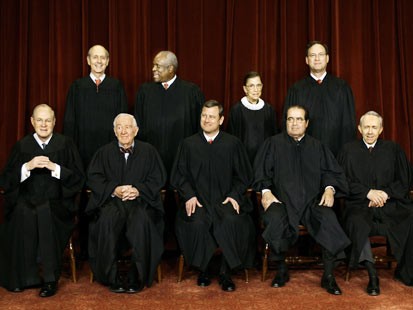Supreme Court Diversity
 There’s a shocking lack of diversity on the U.S. Supreme Court, WaPo staff writer Robert Barnes points out.
There’s a shocking lack of diversity on the U.S. Supreme Court, WaPo staff writer Robert Barnes points out.
There hasn’t been a white Anglo-Saxon Protestant put forward in the five nominations since Justice David H. Souter came to the court in 1990. With Souter’s impending departure, the demographic will be seriously underrepresented on a court that features five Catholics and two Jews.
Of course, as he notes, white guys generally have done okay: “There are seven of them on the current court, and they have accounted for all but four of the 110 justices in the court’s history, who include two black men, two white women, no Hispanics (notwithstanding the disputed Justice Benjamin Cardozo, who served from 1932 to 1938), no Asian Americans and no Native Americans.” So, perhaps WASPs are not the most likely object of sympathy.
More interestingly, none of the current Justices graduated from a public university or law school. And every single one of them served as U.S. appellate judges first, making this the first Court so comprised.
As someone with undergraduate and graduate degrees from public universities who has never served as an appellate judge, I’m very sympathetic to the plight of those groups. Certainly, there have to be dozens of law professors, politicians, think tankers, and others who have the educational background, demonstrated ability to think about complex legal issues at an abstract level, and other attributes required to be a superb Supreme Court justice. (President George W. Bush tried going outside the appellate judge “priesthood” with Harriet Miers but fell rather short.)
At the same time, however, it stands to reason that the most prestigious law schools and the appellate courts will be the proving grounds for virtually all of the seats on the Supreme Court. While there are social and economic reasons that will keep some potentially brilliant lawyers from Harvard, Yale, Chicago, Berkeley, Stanford, Columbia, and NYU the reputation and connections of those schools make them the natural feeders for the most prestigious clerkships, professorships, and postgraduate employment options. The University of Texas or even the University of Alabama are fine schools — and the latter produced Justice Hugo Black — but its graduates are very unlikely to get on the proper “track” to have achieved the milestones likely to impress the ABA, a presidentially appointed search team, and the Senate Judiciary Committee twenty years out of school.
Diversity, shmiversity. Every recent appointee has been a graduate of Harvard or Yale Law. It’s not that graduates of Harvard and Yale Law aren’t intelligent people (that’s a subject for another day). It’s that being that restrictive effectively delegates the chore of narrowing the pool from which Supreme Court Justices are drawn to the admissions departments of two law schools.
There are lots of intelligent people who didn’t get law degrees from Harvard or Yale; there are lots of intelligent people who’ve never been U. S. appellate court judges. The present standards are pretty darned narrow, unnecessarily so IMO.
I wonder if this isn’t yet another example of the designer jeans phenomenon. It’s not there aren’t good jeans that aren’t branded. It’s that the shoppers either don’t have the ability to evaluate what’s good or bad on their own or don’t have the confidence in their ability to evaluate.
you say diversity I say perversity……
Dave: I agree that having gotten into Harvard or Yale at age 22 seems to has effectively become a requirement for the Court and that this is too narrow. But, again, the graduates of these schools are much more likely to get Supreme Court clerkships, prestigious law faculty gigs, U.S. Attorney slots, White House Fellowships, and other gateway assignments.
It’s less true but still incredibly helpful for prestige policy slots, whether we’re talking National Security Council or deputy undersecretary appointments, Hill committee staff, and the like.
well he picked one.
Yeah… and that ‘one’ seems a bit problematic. While not of the ‘presithood’, she’s also got all the racial sensitivity of stone wall. Witness Matt’s headline:
Sotomayor: ‘I would hope that a wise Latina woman with the richness of her experiences would more often than not reach a better conclusion than a white male’…
Now, what would be said if say, Roberts ahd said a line like that…. replacing “White male” for “black female’, eh?
I find it far more disturbing that none of the current sitting justices has ever presided over an actual trial.
I agree w/ Balko. Trial court experience is severely lacking in the current line-up. Some of the rulings, there is a Kennedy decision on wetlands that comes to mind, articulate such vague standards that only Kennedy can decide what the law is.
But AT LEAST the weren’t dumb enough to say that the courts are were policy is made on tape, or should I be happy because she is honest.
Balko’s point is a valid one, but I wonder if the reason for it isn’t an unexpected one. Namely, that they’re all ivy leaugers as Schuler points up:
Grads under these conditions would seem not to take the trajectory through benches in lower courts. The result of such is rulings that have at best a tenuous connection with the real world.
Of course, given the confirmation process, how would somone with an actual trial history get confirmed?
Sotomayor’s stint as Asst NY DA should mitigate that problem.
I’ll take back my comment given that it appears that she was a district court judge before being appointed to the Court of Appeals.